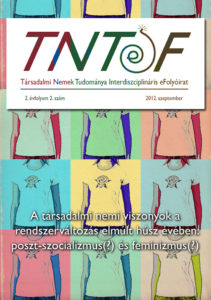(Post-)Socialist Post-Feminism
Main Article Content
Abstract
One possible way to understand the reception of feminism after 1989 in post-socialist Eastern Europe is to analyse the dialogue and lack of dialogue between the state and the “new Yugoslav feminism” as a significant critical discourse. The multifaceted activities of feminist group(s), starting to organise in the early 1970s and though altering, but present ever since, were relying at the same time on the fin-de-siėcle and the interwar Yugoslav feminist traditions, the Marxist theories transmitted within and without the local academia, and the second wave of feminism in Western Europe and the United States. Despite the variegation in the theoretical and political positions of the authors, it can be stated that the new Yugoslav feminism was producing new criticism vis-à-vis the existing socialist system and its promises. In the meantime, the reaction on behalf of the state highly resembles the postfeminist and backlash reactions the Western second wave faces a decade later.

